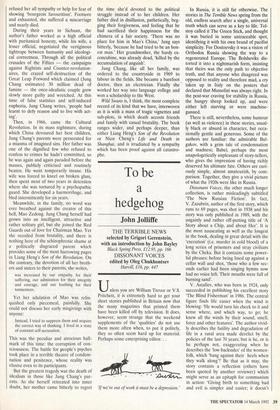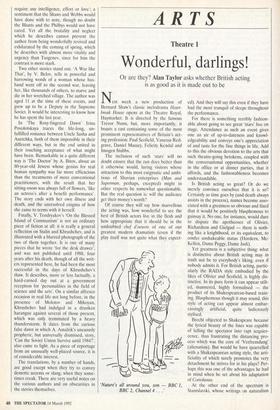To be a hedgehog
John Jolliffe
Unless you are William Trevor or V.S. Pritchett, it is extremely hard to get your short stories published in Britain now that the many magazines that printed them have been killed off by television. It does, however, seem strange that the weekend supplements of the 'qualities' do not use them more often when, to put it politely, they so often seem hard up for material. Perhaps some enterprising editor.. .
If we're out of work it must be a depression.' In Russia, it is still far otherwise. The stories in The Terrible News spring from the old, endless search after a single, universal truth which can serve as a key to life. Tol- stoy called it The Green Stick, and thought it was buried in some untraceable spot, identifying it with his own brand of pacifist simplicity. For Dostoevsky it was a vision of Orthodox Russia showing the way to a regenerated Europe. The Bolsheviks dis- torted it into a nightmarish form, insisting that theirs was the only path to objective truth, and that anyone who disagreed was opposed to reality and therefore mad, a cry taken up in Italy on the posters that declared that Mussolini was always right. In the post-war craving for stability in Russia, the hungry sheep looked up, and were either left starving or were machine- gunned.
There is still, nevertheless, some humour (as well as violence) in these stories, usual- ly black or absurd in character, but occa- sionally gentle and generous. Some of the authors are familiar: the admirable Bul- gakov, with a grim tale of condemnation and madness; Babel, perhaps the most unapologetically unpleasant of story-tellers, who gives the impression of having richly deserved his ultimate fate. Others are curi- ously simple, almost amateurish, by com- parison. Together, they give a vivid picture of what the 1920s were like in Russia.
Dissonant Voices, the other much longer collection, is rather misleadingly subtitled `The New Russian Fiction'. In fact, V. Zazubrin, author of the first story, which runs to 69 pages, was shot in 1938 and his story was only published in 1989, with the ungainly and rather off-putting title of 'A Story about a Chip, and about Her'. It is the most nauseating as well as the longest in the book, dealing in great detail with the `execution' (i.e. murder in cold blood) of a long series of prisoners and stray civilians by the Cheka. But it contains some power- ful phrases: before being lined up against a cellar wall and shot, 'those who a few sec- onds earlier had been singing hymns now had no voice left. Their mouths were full of burning sand'.
V. Astafiev, who was born in 1924, only succeeded in publishing his excellent story `The Blind Fisherman' in 1986. The central figure finds life easier when the wind is blowing: 'He would turn his cheek to it and sense where, and which way, to go; he knew all the winds by their sound, smell, force and other features'. The author vivid- ly describes the futility and degradation of life in a rural area made derelict by the policies of the last 70 years; but is he, or is he perhaps not, exaggerating when he describes the low backsides' of the women- folk, which 'bang against their heels when they walk along'? Be that as it may, the story contains a reflection (others have been quoted by another reviewer) which might serve as an epitaph for communism in action: 'Giving birth to something bad and evil is simpler and easier; it doesn't require any intelligence, effort or love'; a sentiment that the Shaws and Webbs would have done with to note, though no doubt the Blunts and the Philbys would not have cared. Yet all the brutality and neglect which he describes cannot prevent the author from being wonderfully revived and exhilarated by the coming of spring, which he describes with almost more vitality and urgency than Turgenev, since for him the contrast is more stark.
Two other stories stand out. 'A War like That', by V. Belov, tells in powerful and harrowing words of a woman whose hus- band went off to the second war, leaving her, like thousands of others, to starve and die in her wretched village. The author was aged 11 at the time of these events, and grew up to be a Deputy in the Supreme Soviet. It would be interesting to know how he has spent the last year.
In 'The Rosy-fingered Dawn' Irina Povolotskaya traces the life-long, un- fulfilled romance between Uncle Sasha and Anetchka, both of them impossible in their different ways, but in the end united in their touching acceptance of what might have been. Remarkable in a quite different way is 'The Doctor' by A. Bitov, about an 80-year-old Jewess whose genius for real human sympathy was far more efficacious than the treatments of more conventional practitioners, with the result that her sitting-room was always full of flowers, 'like an actress's after a benefit performance'. The story ends with her own illness and death, and the unresolved enigma of how she came to terms with it herself.
Finally, V. Tendryakov's 'On the Blessed Island of Communism' is not an ordinary piece of fiction at all: it is really a general reflection on Stalin and Khrushchev, and is illustrated with a blurred photograph of the two of them together. It is one of many pieces that he wrote 'for the desk drawer', and was not published until 1988, four years after his death, though of all the writ- ers represented here, he had been the most successful in the days of Khrushchev's thaw. It describes, more or less factually, a hard-earned day out at a government reception for 'personalities in the field of science and the arts'. On a similar alfresco occasion in real life not long before, in the presence of Molotov and Mikoyan, Khrushchev had indulged in a drunken harangue against several of those present, which was only terminated by a heavy thunderstorm. It dates from the curious false dawn in which A. Amalrik's uncannily prophetic, but universally dismissed, story, 'Can the Soviet Union Survive until 1984?', also came to light. As a piece of reportage from an unusually well-placed source, it is of considerable interest.
The translations, by a number of hands, are good except when they try to convey demotic accents or slang, when they some- times creak. There are very useful notes on the various authors and on obscurities in the stories themselves.



























































 Previous page
Previous page